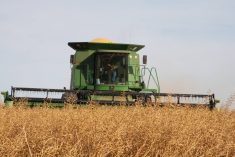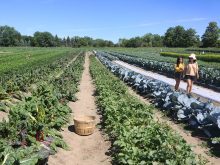Program teaches kids about composting
Maple Leaf Foods and Earth Rangers have launched a program to teach young people about where their food comes from.
The partnership kicked off earlier this month with a Build Your Own Compost activity that explains how important it is to give nutrients back to the soil.
The activity shows children how to make a compost bin, what to put into it and how long it will take to create plant food for their own garden.
The app-based challenge is funded by Maple Leaf Foods.
Read Also

Canada told trade crisis solutions in its hands
Canadians and Canadian exporters need to accept that the old rules of trade are over, and open access to the U.S. market may also be over, says the chief financial correspondent for CTV News.
Last year, the partners organized the Future Farmer’ Mission All Taste, No Waste Challenge. It inspired young people to log environmentally friendly habits such as reusing leftovers, also known as upcooking. Collectively they saved more than 19,000 plates of food from the landfill
Applications open for Nuffield scholarships
Nuffield Canada is taking applications for next year’s agricultural scholarships.
The deadline is June 30.
The Nuffield Scholarship is available to Canadian citizens who are involved in any aspect of agriculture. It is aimed at mid-career applicants who are interested in self-directed international travel and study.
Candidates can apply through a written and one-way video application process, from which a short list is interviewed and then final selections made.
Successful candidates will be awarded a $20,000 scholarship. They must do a minimum of 10 weeks of travel study within 24 months to examine and research a topic of their choosing relevant to modern production or practices. They then write a scholar report (approximately 10,000 words) on their research findings, conclusions and recommendations, and make a presentation at Nuffield Canada’s annual general meeting.
Recipients can come from all areas of primary production including food, fibre, health care, biofuel, forestry, aquaculture and fisheries. They can represent any aspect of the value chain such as primary production, processing, governance, communications, safety and mental health.
Applicants are encouraged from all production philosophies such as commercial, organic, cottage, medicinal, Indigenous, kosher and halal.
Nuffield Canada has more than 130 alumni and has affiliate organizations in Argentina, Australia, Brazil, Chile, France, Germany, Ireland, Japan, Kenya, Netherlands, New Zealand, South Africa, United Kingdom, the United States and Zimbabwe.
Researchers enter next berry challenge phase
Two University of Guelph-led research teams have entered the second phase of the Homegrown Innovation Challenge, a $33 million competition to grow berries out of season and at scale in Canada.
The initiative is funded and delivered by the Weston Family Foundation.
Mike Dixon and Youbin Zheng, both professors in the Ontario Agricultural College’s School of Environmental Sciences, are leading teams exploring sustainable and cost-effective ways to extend the growing season of berries.
Their teams are among 11 selected nationwide to develop small-scale, proof-of concept berry-growing solutions. Figuring out how to grow berries out of season — sustainably and competitively — is expected to unlock solutions for myriad other fruits and vegetables.
Dixon and his team have received $691,730 to develop a controlled environment agriculture system that manages strawberry production to meet market demands and consumer preferences.
Zheng and his team have received $999,918 to use artificial intelligence and smart automation to take the guesswork out of providing optimal growing conditions for berries.
WGRF continues U of M technician funding
The Western Grains Research Foundation will contribute $835,000 for the renewal of two technician positions at the University of Manitoba through 2029.
The foundation has funded the positions for the last five years.
Over the next five years, the long-term cropping systems technician will support several long-term agronomic studies at the university, while the field crops research technician will support undergraduate students, graduate students and post-doctoral fellows in plant science and soil science.
Mental health initiatives funded
The Canadian Centre for Agricultural Wellbeing will receive $1.08 million in federal funding through the AgriCompetitiveness Program, an initiative under the Sustainable Canadian Agricultural Partnership.
This project funds initiatives such as supports for mental health literacy education for agriculture educators, the development of a mental health toolkit to support the sector in case of catastrophic events, and help for industry to further develop capacity throughout the sector and facilitate the sharing and expansion of national farm mental health strategies and resources.
The centre will also develop Canada’s first evidence-based agriculture literacy training program in collaboration with the Rural Physicians Society of Canada to deliver training to rural physicians who interact with Canadian farmers and organize two national conferences that will enable mental health information sharing with stakeholders from across the sector.
















